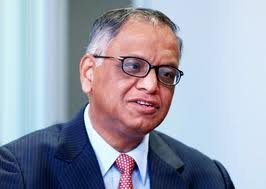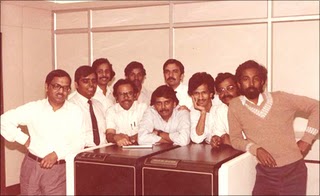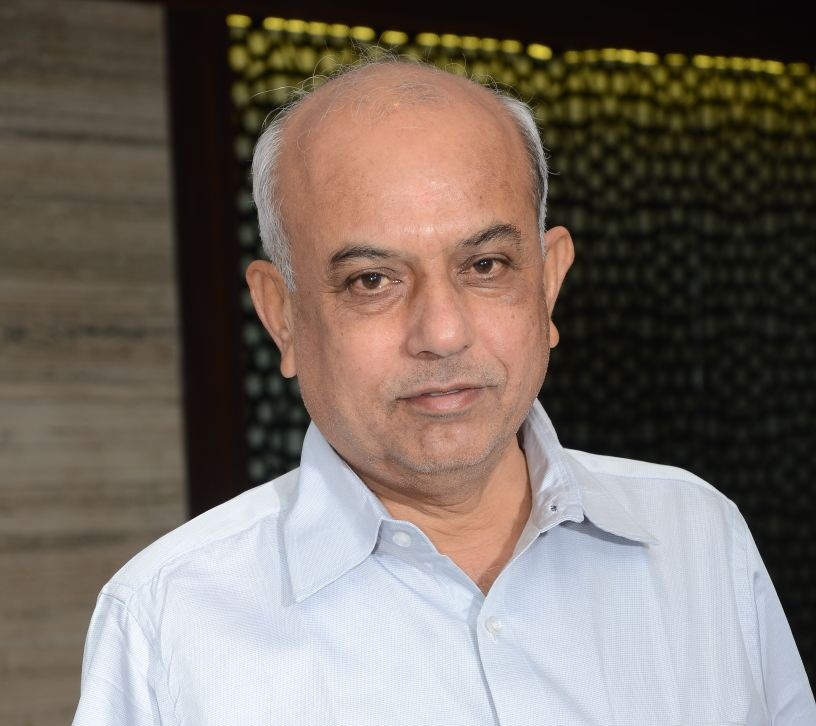
Narayana Murthy
Mr. Narayana Murthy is the Founder Member & Chairman of India’s one of the highly successful & reputed IT company – Infosys. He started his entrepreneurship journey along with his friends in a 100-sq feet apartment with borrowed capital of Rs. 10,000/-. His strong vision & leadership skill has evolved infosys to one of the best IT services company having 28 million sq. ft. of world-class development centers across the globe.
He’ll be succeeded by eminent banker K V Kamath as Infosys’ chairman with effect from August 21. He would thereafter become ‘Chairman Emeritus’ of the company.
Following is excerpt from his farewell letter which can be a guideline & motivational factor to any startup or budding enterprenure.
Assembling a team of extraordinary people who have displayed outstanding capabilities through their value system competence, low ego and high energy is crucial to the progress of any institution.
The differentiation comes from ideas and ideas come from bright minds. Therefore, good people are the primary assets of a great organization.

infosys co-founders
It is essential to realize that even the best people may not be able to run the entire marathon.
Different people run out of endurance and intellectual horsepower at different points of time. Some people drop out of the marathon since they do not see any value in an organization when their own time under the arc light is over. Leader’s responsibility is to recognize this, provide them opportunities outside the organization, and usher in suitable replacements. Infosys’ journey is replete with many such examples.
Many intelligent people possess a high ego and low patience to deal with people less capable than themselves.
Leaders have to manage this anomaly very carefully; counsel these errant people from time to time, and allow them to operate as long as they do not become dysfunctional and start harming the organization.
If they do cross the threshold it takes courage to inform the individuals that their time in the organization is over and that they have to leave.
However, one aspect that marks out a truly superior organization is the ability of its employees at all levels to be driven by values and to ensure adherence and compliance under any circumstance.
No individual is high or important enough for an organization to put up with non compliance.
Leadership by example is what creates trust in people to follow a leader.
As long as a leader is able to show his or her sacrifice and commitment to a cause others will follow him or her I am glad we decided on respect from our stakeholders (customers employees investors vendor partners government of
the land and the society) as the primary objective of the company I have seen hundreds of instances of such leadership-by-example at Infosys.
Generosity is an essential part of a leader. It is the foundation on which teamwork is built.
The ability to share the limelight with ones colleagues, the ability to step aside and give opportunity to younger people when they want that fame, power and glory: and the ability to provide a safety net of advice for them is an important aspect of strengthening the future of an organization.
I have been saying for many years now that the factors that differentiate a corporation from its competitors are an enduring value system open mindedness, pluralistic and meritocratic approach and practicing speed, imagination and excellence in execution.
Leaders have to focus on creating such an environment.
Leadership is about taking bold and firm decisions with incomplete information in an environment of uncertainty: Leaders who waffle do not inspire confidence in their people.
It is important to use as much data and modeling as possible to eliminate clearly.
- Sense of ownership among employees
A sense of ownership among employees is extremely important to build a long term future for a corporation.
Such ownership comes from fair merit based and generous sharing of wealth and perquisites among each member of the company.
This is my answer to many of my friends who wonder why when Infosys was founded I took a small percentage of my earlier salary while every other cofounder’s salary was increased by at least 10 per cent.
The same friends tell me that they do not know of any other instance where as much as 10 to 15 per cent of the company equity was given to co-founders who had just 12 to 18 months of work experience.
My decision to walk away from a Fortune 10 company when they contributed 25 per cent of our revenue was one such example of decision making under uncertainty.
It was a tough decision that was taken so calmly and firmly that the head of sales at Infosys at that time thought I was not bothered about the future of the company.
I had to explain to him that I did indeed agonize over it but that as a leader I could not be driven by panic since such an important decision required a calm and composed mind.
Scalability is the true test of the endurance of an organization.
The ability to grow successfully without losing quality productivity employee investor and customer satisfaction and the spirit of a small company is what makes Infosys a great company.
We have grown from 50 customers to 620 customers from 10 projects to 6,500 projects from 100 employees to 130,820 employees from 100 sq ft to 28 million sq ft of built up space and from 100 investors to over 450,000 investors.
Such a scalability exercise has been successful thanks to our PSPD model of operation.
PSPD stands for Predictability of revenues, Sustainability of such predictability, Profitability of such realized revenues and Derisking.
Predictability happens because of a good forecasting system that derives realistic data from the trenches and tempers it with the wisdom of senior business leaders.
Sustainability refers to the systems that help the efforts of sales people beating the pavement and meeting customers to make the prediction true, the efforts of our delivery people to deliver quality products on time within budgets, and to the efforts of our finance people raising the invoice on time and collecting money on time.
Profitability refers to the systems that help our people make value-based sales, follow rigorous budgeting exercises, control costs, get best value for money and ensure the agreed-upon profitability.
Derisking refers to systems that identify risks in various dimensions of our operations – people, geographies, technologies, application areas and services – collect periodic data, review the risk levels and mitigate them.
Innovation is the best instrument for creating sustained differentiation.
However it must be accepted that revenues for a corporation come from well understood ideas and business models.
For example, most of a bank’s revenues will come from borrowing money at a certain rate and lending it at a higher rate. Part of the profits from such models will be used for research and development to generate new ideas.
A few of these ideas will be seeded and some of them will become mainstream revenue earners. Therefore, it is very important for a leader to focus on innovation particularly when the times are good.
Customers put food on our table.
Therefore, we have to have a laser focus on exceeding their expectations, being open and honest with them, and ensuring that they look good in front of their customers.
Employees are the only instruments we have to make our customers and investors succeed.
Therefore, we have to create an environment of openness, meritocracy; fairness, transparency, honesty and accountability amongst our employees.
Our investors understand that businesses will have their share of up and downs.
They want us, the management, to level with them at all times. Therefore, “when in doubt, please disclose” is a good policy for a corporation.
Society provides customers, employees, investors, bureaucrats and politicians. Therefore, earning the goodwill of every society that we operate in is extremely important for us.
Global benchmarking is a powerful instrument that helps us to improve our self-confidence, compete with the best global competitors and serve our customers better.
We Indians must recognize as we have done at Infosys that we are our main enemies.
There is no external enemy. Our failures are because of our lack of commitment to our cause, our inability to accept meritocracy and our indifference to honesty and want of a good work ethic amongst our leaders.
Performance alone is the key differentiator. This stems from my belief that performance leads to recognition brings respect and respect brings power.
Therefore if India wants to be a superpower as we keep hoping the only instrument we have is performance.
- Grace and courtesy make us worthy competitors
We have demonstrated that businesses can be run legally and ethically that it is possible for an Indian company to benchmark with the global best and that any set of youngsters with values hard work team work and a little bit of smartness can indeed be successful entrepreneurs.
This way we have enthused millions of young men and women in India. This in my opinion is Infosys’ greatest contribution.
I have realized that humility grace and courtesy are genuine only when you have power and glory. That is why the leaders at Infosys have practiced this time and again.
Humility provides us the strength of mind to learn from people better than us. Grace and courtesy make us worthy competitors.
They also remind us that such glory and power are ephemeral and give us the strength to handle the days when we too could lose our shine.
The crucial things we have to do in the future are to recognize our weaknesses; be open-minded about learning from people better than us; learn from our mistakes and not repeat them; be humble, honest and courteous; benchmark with the best in every dimension; use innovation to perform at global levels; and create a worthwhile vision and improve every day.
This is how our mantra of focusing on speed imagination and excellence in execution will take this company very far.
Letter Credit – Infosys Annual Report 2010-2011
Article Link – http://www.rediff.com/business/slide-show/slide-show-1-what-narayana-murthy-said-in-his-farewell-letter/20110518.htm




